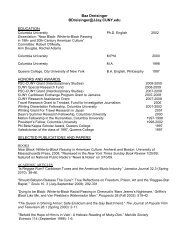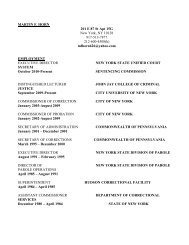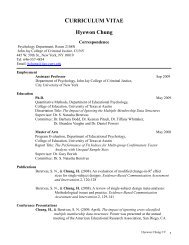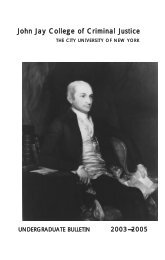Bulletin - John Jay College Of Criminal Justice - CUNY
Bulletin - John Jay College Of Criminal Justice - CUNY
Bulletin - John Jay College Of Criminal Justice - CUNY
Create successful ePaper yourself
Turn your PDF publications into a flip-book with our unique Google optimized e-Paper software.
Certificates, Programs and Minors<br />
300-Level: Choose one<br />
Music 310 Comparative History of African American Musics<br />
Track II: Music Composition/Theory/Technology<br />
200-level, Choose two<br />
Music 202 Songwriting<br />
Music 220 Choral Music in Performance<br />
Music 2XX Music Technology<br />
Music 2XX Music Theory<br />
Music 2XX Guitar & Chamber Ensemble<br />
300-level, Choose one<br />
Music 3XX Composition/Technology<br />
Total: 18<br />
PHILOSOPHY MINOR<br />
Description. The Philosophy minor is designed to give students<br />
interested in philosophy the opportunity to do intensive work in the<br />
field and have that work recognized. Philosophy — a term derived<br />
from the ancient Greek philosophia — means “love of wisdom.” As<br />
a discipline, philosophy strives to seek thoughtful and rigorous<br />
responses to the most fundamental “Why” questions about<br />
ourselves, the universe and our place in the universe. Areas of study<br />
include being or existence, knowledge, ethics, political philosophy<br />
and various “philosophy of . . .” issues (e.g., philosophy of law,<br />
philosophy of mind, philosophy of language, etc.). Some core<br />
questions that philosophers ask range from “What is the nature of<br />
justice” and “How should I live my life” to “Do humans have free<br />
will” and “What sort of justification is required for me to have<br />
knowledge”<br />
Learning objectives for Philosophy minors include the development<br />
and mastery of the following skills and competencies.<br />
• Critically evaluate arguments<br />
• Appreciate different responses to a given philosophical<br />
question<br />
• <strong>Of</strong>fer a thoughtfully defended thesis on a given philosophical<br />
question<br />
• Entertain and respond to challenges to one’s thesis<br />
Rationale. A Philosophy minor, which is noted on the student's final<br />
transcript, is extremely beneficial for students planning careers in law<br />
school or various graduate programs. A liberal arts and humanities<br />
education, according to some of the top law schools, is the best<br />
preparation for understanding, synthesizing, and evaluating the legal<br />
theory and moral reasoning employed in legal judgments. Both law<br />
schools and graduate schools place a premium on the sort of critical<br />
thinking and conceptual analysis that philosophy uniquely provides.<br />
In addition, there is statistical evidence that those who major in<br />
philosophy consistently score higher than those in nearly every other<br />
major on standardized exams such as the LSAT and the GRE.<br />
Minor coordinator. Professor Tanya Rodriquez, Department of<br />
Philosophy (212.237.8338, trodriguez@jjay.cuny.edu)<br />
Requirements:<br />
• A student must complete 18 credits (six courses) in philosophy.<br />
• Philosophy 231 is required (also fulfills the general education<br />
requirement for philosophy).<br />
• At least two courses must be at the 300-level or higher.<br />
• Independent study courses, arranged between the student and a<br />
supervising faculty member, and experimental courses can be<br />
used to fill the 18-credit requirement. For details on<br />
independent study courses, see the Chapter 6, Academic<br />
Standards.<br />
Philosophy courses satisfying the requirements of the minor include<br />
the following:<br />
Students will be able to:<br />
• Recognize and reconstruct arguments<br />
198

















